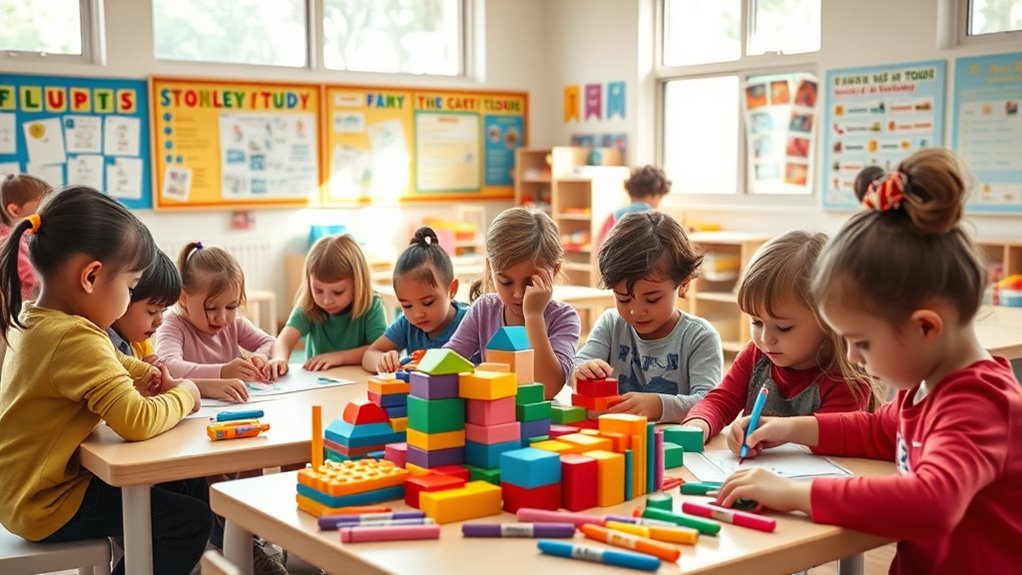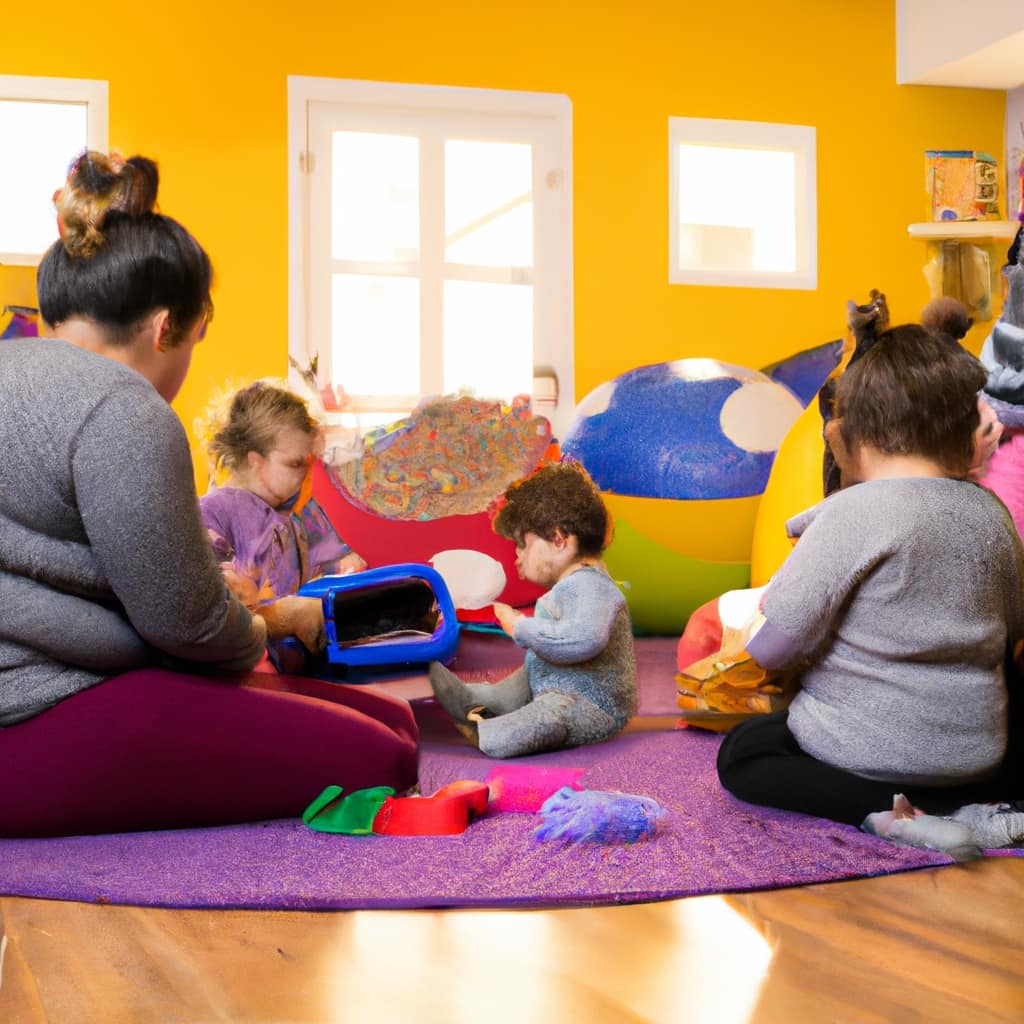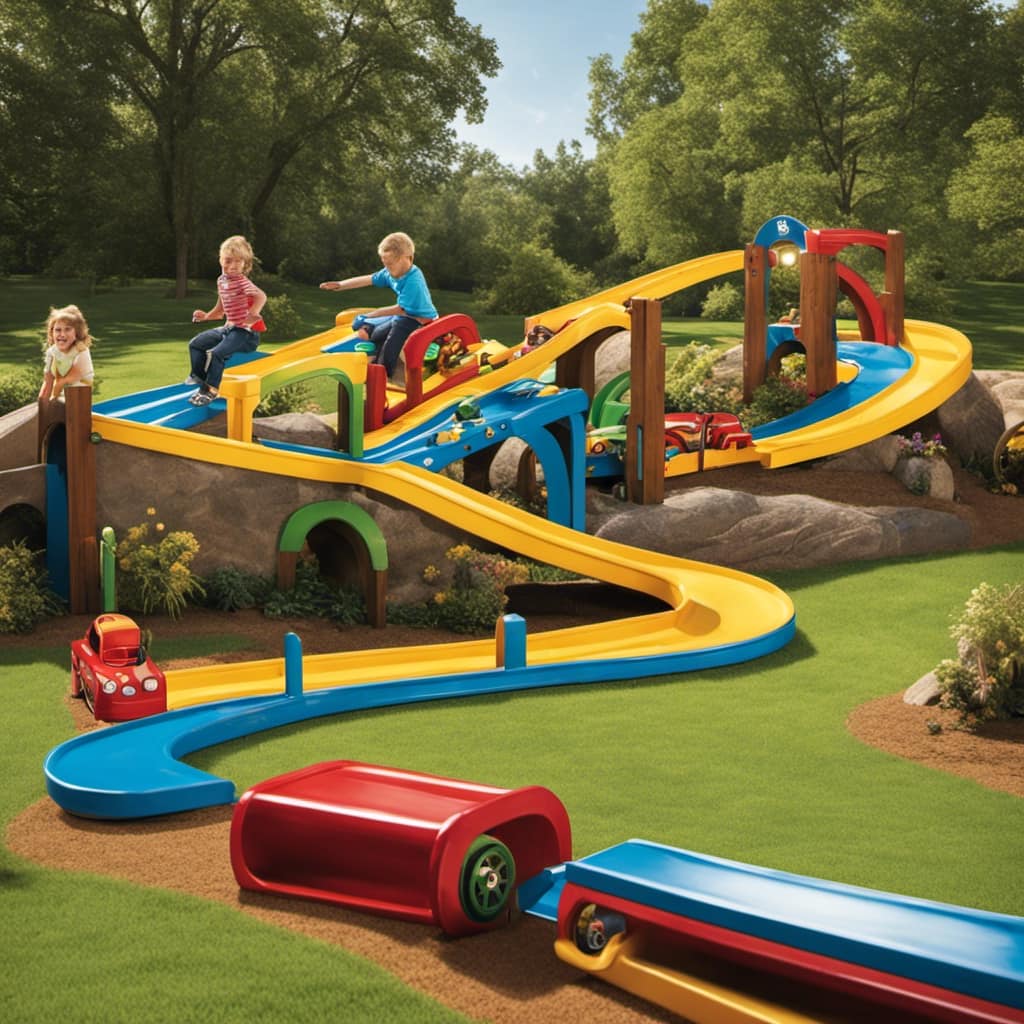To help your preschooler succeed in kindergarten, focus on developing their social-emotional skills, like managing feelings and building relationships through simple conversations and role-playing activities. Support fine motor development with activities such as drawing, threading beads, and using tweezers, which boost coordination and independence. Also, establish routines that include healthy snacks and fun routines like juice blending. Keep exploring these strategies to learn more about preparing your child for a smooth start in school.
Key Takeaways
- Developing social-emotional skills like sharing, turn-taking, and emotional expression prepares children for positive classroom interactions.
- Engaging in role-playing activities helps preschoolers practice communication, conflict resolution, and relationship building essential for school success.
- Fine motor activities such as drawing, cutting, and threading enhance skills needed for writing and classroom tasks.
- Incorporating routines like snack preparation and juice blending supports independence, coordination, and healthy habits.
- Creating a supportive environment fosters emotional security, curiosity, and resilience, setting a strong foundation for learning.

Getting your preschooler ready for school involves more than just counting numbers or learning the alphabet. It’s about helping them develop the skills that will support their growth, confidence, and ability to navigate the classroom environment. Two key areas to focus on are social-emotional development and fine motor skills. These foundational skills shape how your child interacts with others, manages emotions, and completes tasks that are essential for a successful start to kindergarten.
Social-emotional development is vital because it influences how your child manages feelings, builds relationships, and adapts to new situations. You can encourage this growth by creating a nurturing environment at home, where your child feels safe expressing themselves. Practice conversations about feelings, using simple language to identify emotions like happy, sad, frustrated, or excited. Role-playing activities can also help your preschooler learn how to share, take turns, and resolve conflicts. When your child feels emotionally secure, they’re more likely to approach school with curiosity and resilience, ready to face new challenges.
Fine motor skills are equally important because they enable your preschooler to perform everyday tasks, from holding a pencil to buttoning a coat. These skills are essential for classroom activities like writing, cutting with scissors, and manipulating small objects. To support this development, provide plenty of opportunities for your child to engage in activities that strengthen their hand muscles. Playing with playdough, threading beads, or using tweezers to pick up objects are excellent ways to enhance fine motor control. Additionally, encouraging your preschooler to draw, color, and practice writing their name helps refine their hand-eye coordination and precision. As these skills improve, your child will gain confidence in completing school-related tasks independently.
Furthermore, understanding the importance of juice extraction and nutrition can help you incorporate healthy snacks that support their overall development and energy levels. By intentionally blending these activities into daily routines, you’re laying a strong foundation for your preschooler’s academic and social success.
Frequently Asked Questions
How Can Parents Effectively Support Preschoolers’ Social Skills at Home?
You can support your preschooler’s social skills at home by organizing regular playdate planning, giving them opportunities to interact with peers. Use positive reinforcement to praise sharing, cooperation, and kindness, which encourages good social behaviors. Encourage your child to express their feelings and listen to others. These actions help build their confidence and empathy, laying a strong foundation for successful social interactions both now and in school.
What Are Simple Activities to Boost Preschoolers’ Emotional Regulation?
Imagine a calm pond, ripples fading peacefully—that’s how you want your preschooler’s emotions to settle. You can boost emotional regulation by teaching simple activities like identifying feelings through storybooks or using calming strategies such as deep breathing or gentle music. Encourage your child to recognize their emotional cues and practice calming techniques, helping them manage feelings better and develop emotional recognition, leading to greater resilience and self-control.
How Do I Assess My Child’s Readiness for Kindergarten?
To assess your child’s readiness for kindergarten, start by observing their progress on a developmental milestones checklist. Look for skills like independence, social interactions, and basic academic abilities. You can also talk with teachers or caregivers to get their insights. Trust your instincts and consider how your child handles routines and new situations. This combined approach helps you determine if they’re prepared to start school confidently.
What Role Does Technology Play in Preschool Learning?
Technology acts as both a tool and a challenge in preschool learning. While digital literacy helps your child develop vital skills, too much screen time can hinder social and physical growth. You should balance tech use by choosing educational apps and setting screen time limits. This way, your kid benefits from technology, enhancing their learning without sacrificing essential play and interaction skills needed for kindergarten success.
How Can I Encourage Independence in Preschoolers Before School Starts?
You can encourage independence in preschoolers by promoting independent play, which helps them explore and solve problems on their own. Establish simple self-help routines like dressing, washing hands, and tidying up, involving them actively in these tasks. Praise their efforts to build confidence. Giving them responsibilities and encouraging decision-making fosters independence, preparing them for school. Consistency and patience will help your child develop essential self-reliance skills.
Conclusion
By nurturing these essential skills now, you’re setting your preschooler up for success. For example, imagine Jamie, who practiced sharing and taking turns at home; come kindergarten, Jamie confidently joined new activities and made friends easily. When you encourage activities that develop social, emotional, and cognitive skills, you’re helping your child build a strong foundation for learning and growth. Keep supporting their journey—your involvement makes a real difference in their future school experience.











